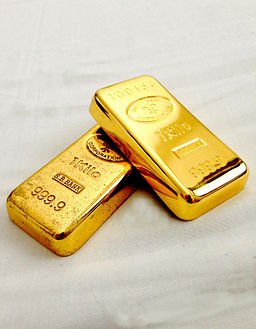
Image Credit
After reading about the upcoming release of the 2018 Steem silver round, I began to regret not getting in on the 2017 edition. Luckily, @sevinwilson still had some that he was willing to part with, so I was able to buy a couple just this week. I received them in the mail just last night, as a matter of fact; but, I haven't opened the package, yet. Things have been super busy, and I want to wait until I get a chance to savor the moment and perhaps get some video.
With the exception of some old silver dollars that my grandma use to give us grandkids when we were babies, this is my first foray into precious medals. I actually bought them more for sentimental reasons than as an investment, but I've read enough about silver stacking here on Steemit that it has my interest piqued. But, I'm the kind of person that has a hard time jumping into something without doing my own research, so I've been looking into it a little bit, and I was shocked to learn that it is possible for the US government to just up and confiscate its citizen's gold coins and bullion. Not only can they, but they have already done it in the past!
It started in the midst of World War I back in 1917 with the Trading With The Enemy Act, which made it illegal for Americans to engage in any dealings with enemies of America. It also gave the president the ability to regulate, investigate, and prohibit any foreign transactions made with any currency, including gold and silver. Then in 1918, just before WWI ended, Congress expanded the law to allow the president to regulate, investigate, or prohibit the hoarding of gold by anyone in the country, and extended it so that it would remain in effect for two years after the war was over. Finally, in 1920, the wartime act expired, and Americans were free to start stacking, again.

Image Credit
That is, until Franklin D. Roosevelt took over as president in 1933. At the time, there was a run on banks by citizens wishing to trade their paper dollars in for their gold value. In an attempt to stop this, Roosevelt - just one day after taking office - called a special Congressional session scheduled for four days later to get the old Trading With The Enemy Act reinstated. Then, in a gross abuse of power, he closed all banks until after Congress was able to meet. Within in the span of 7 1/2 hours, they were able to railroad the Emergency Banking Act. Then, under the authority of his newly gain power, Roosevelt signed an executive order which called for Americans to turn in their gold. Citizens were only allowed to keep up to $100 worth of gold, or gold coin that was recognized as "having special value to collectors of rare and unusual coins." Back then, the American dollar was on the gold standard, meaning that every dollar was backed by a certain amount of gold being stored by the government. The goal was to collect all of the gold that the public was "hoarding" so that more paper money could be created. The consequences for refusing to turn in your gold were steep, too! Citizens could be forced to pay a fine of up to $10,000 (that's $188,186.26 in today's money), serve up to 10 years in prison, or both. This remained the law of the land, with a few modifications here and there, for the next 40+ years, until Gerald Ford repealed Roosevelt's executive order in 1974.
Once again, Americans were able to collect and hoard their gold. Then, in 1977, Congress limited the president's ability to regulate gold transaction to times of war, only. But, does that mean it couldn't happen again? According to Henry Mark Holzer, professor emeritus at Brooklyn Law School, it very well could. Even though the American dollar is no longer on the gold standard, the frameworks are still in place for the Executive branch to declare a wartime emergency and confiscate all of our gold. And, who's to say that it would stop with our gold? Why not confiscate our silver? The fact is, Roosevelt did that, too! Under Executive Order 6814 the US government collected nearly 113 million ounces of silver from its citizens. In their defense, they did pay out $0.50 an ounce, which was higher than the melt price at the time. Still, that is a lot of power for a democratic government to be able to wield.
Now, bare in mind that I don't have any experience at all in this area. I was actually quite surprised at the possibility of the government taking something that is mine! Remember, I was doing this research because I've been thinking about the possibility of starting my own stack of precious metals. Learning that it might not actually be my stack has given me some pause. I'm curious to hear what some of you have to say about it; especially those of you who are already stacking. Do you think it is anything to be concerned about?

Yes, they can. But they will not. It would give too much credibility, to Gold's real value.
They can and will attempt to confiscate whatever they want. Always under threat of violence.
I was going to say much the same. Alot of anti stackers use this as a reason not to stack but the truth is they could try to confiscate anything if they wanted to..guns, money, land etc. Dont use that fear as a reason not to buy gold and silver and protect your hard earned money. I'd say they won't and even if they did they're not traceable and ppl will always accept them regardless of what the govt does. They'd only really be able to take them if you gave them up freely 😉
I believe that most of the west, especially, the USSA, so few people currently have ANY interest in precious metals. The Second Amendment is the next reason they will not confiscate. Third, they may impose restrictions to selling precious metals, or taxing it at such extreme rates, as a reverse way to initiate confiscation. So the answer, IMHO, is to diversify your stack, hold in many stable international locations, tell as few people about what you own. As this forum is very "OPEN" in posting everything they have at home. You all know, everything posted is never deleted. What is known can be found through the future use of AI, which you know our government have now, which we will have in 20 years.
Yes absolutely! This is a huge concern. There is a huge difference between silver coinage (pre 1964 coins) and silver bullion. It's likely that bullion would be considered 'hording' while coinage would (might) be considered 'collecting'. Don't put the 'collection' in a saftey deposit at a bank, since it can be seized. @ironshield
Interesting. So, pre '64 coins aren't as likely to be confiscated?
I agree with the others, anything could be confiscated, but unfortunately for me, I lost all of my silver and gold last summer while boating on the Mississippi river, and again this winter ice fishing. Dam shame (horrible pun intended)
Come to Europe! No worries here for something like that confiscating. Governments takes enough each year already by direct income tax. I paid 50% on the top part. But no complaining.
Great research. Very interesting!